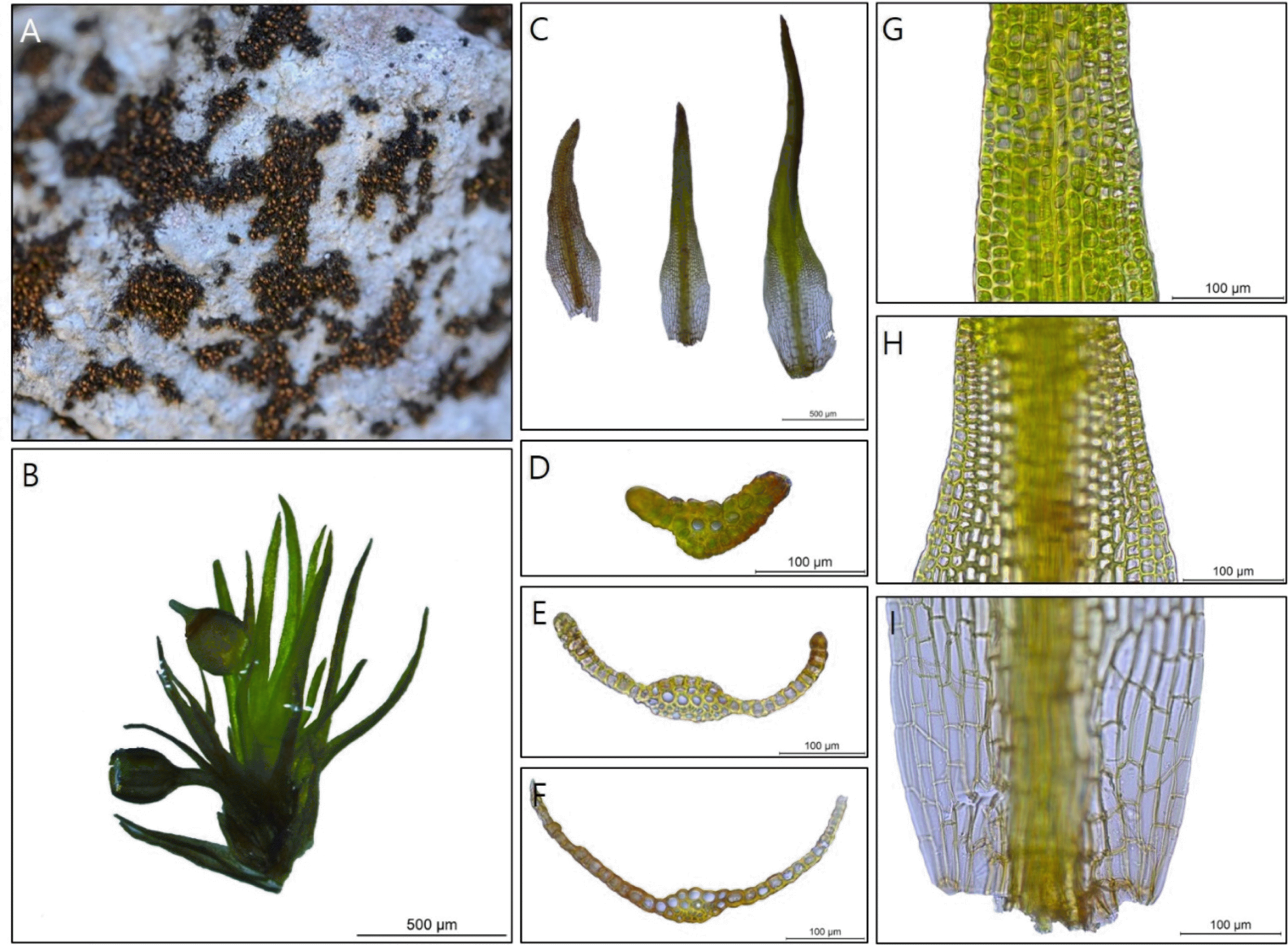In the course of study of mosses in Hallasan Mountain of Korean peninsula the first author collected a peculiar Brachydontium which was identified as Brachydontium olympicum.
Brachydontium is a genus of tiny, brownish plants of acidic rocks with striate capsules and peristomes ranging from well-developed to completely absent. It includes 9 species in the world (Vitt and Spence, 2007). Brachydontium (as Brachyodus Furnr. ex Nees & Hornschuch) was originally placed in the Seligeriaceae by Schimper (1855), but later Schimper (1860) established a separate family Brachyodontaceae to accommodate the genera Brachydontium and Campylostelium Bruch & Schimp. Recently, Brachydontium was placed in the family Ptychomitriaceae by phylogenetic analysis and morphological characters (Fedosov et al., 2017).
Brachydontium olympicum was described from North America (Olympic Mountains of Washington) by E. Britton as Grimmia olympica Britton (Frye, 1910). McIntosh and Spence (1986) transferred this taxon from Grimmia (Grimmiaceae) to Brachydontium (Seligeriaceae) by laminal shape and areolation morphology of the leaf apex and costal anatomy, following the suggestion of Deguchi (1978). Iwatsuki et al. (2004) reported that B. polycarpum H. Akiyama from Japan is identical to B. olympicum from the Pacific Northwest. The name B. olympicum has priority over B. polycarpum (Exeter et al., 2016).
Below we provide the description of Brachydontium olympica based on the material from the Hallasan Mountain in Jejudo Island. The field excursions were carried out in 5 Nov 2017. The voucher specimens are kept in the herbarium of Jeonbuk National University (JNU) and National Institute of Biological Resources (NIBR). Microphotographs were taken by using Microscope Leica DFC450. Nomenclature and classification of mosses follows Goffinet et al. (2008).
Taxonomic Treatment
Brachydontium olympicum (E. Britton) T. T. McIntosh & J. R. Spence, Bryologist 89: 200, 1986 [1987]. (Fig. 1)
Grimmia olympica E. Britton, Bryologist 13: 59, 1910.
Brachydontium polycarpum H. Akiyama, Acta Phytotax. Geobot. 48: 62, 1997.
Korean name: KKo-ma-ba-wi-i-kki (꼬마바위이끼).
Plants olive-green to brownish, minute, 1–4 mm long, simple or sparingly branched, densely leaved. Leaves gradually tapering to an elongate, linear acumen from an oblong or ovate base, 0.7–1.8 mm; margins erect, bistratose; costa occupying the greater part of the leaves upper part. Median laminal cells subquadrate, rounded or irregular, 5.0–12.5 μm thick walled; basal cells hyaline, rectangular, 12.5–50.0 × 7.5–1.25 μm thin walled. Autoicous. Setae 0.2–0.5 mm, often curved. Capsules globose to short-ovate, 0.1–0.4 mm, slightly sulcate when dry. Annulus well-developed. Operculum rostellate, to 0.2 mm long. Calyptra mitriform, to 0.35 mm long, Peristome absent. Spores 5.0–10.0 μm.
Specimen examined: Republic of Korea, Jeju-do, Hallasan Mountain, Y valley, elev. 1,788 m, 5 Nov 2017, S. J. Park & S. S. Choi 17113036 (JNU duplicate in KB).
Habitats: On thin soil covered rocks and in crevices of rocks on the volcanic mountains.
Distribution: Japan (Honshu), Russia (South Far East), Western North America and Korea (Jeju-do).
B. olympicum is known from Japan, Russia, North America and circum-North Pacific montane species. In western North America, it is known from Alaska, British Columbia, Washington, and Oregon (Exeter et al., 2016; Suzuki, 2016; Vitt and Spence, 2007). Hallasan Mountain (Jejudo Island) is meaningful as the southernmost limit region in the distribution.
Brachydontium are distributed in East Asia with 3 species as B. olympicum, B. trichodes and B. noguchii. B. noguchii Z. Iwats., Tad. Suzuki and Kiguchi be considered as merely a minute form of B. olympicum (Fedosov et al., 2017). B. trichodes grows in environment similar to B. trichodes. B. olympicum can be distinguished from B. trichodes by its (1) olive-green to brownish color, (2) subulate blunt-tipped leaves that have incurved margins and bistratose isodiametric cells in the upper half, (3) short (0.5–2.0 mm) and usually twisted arcuate setae, (4) globose, ribbed capsules that lack a peristome and (5) habitat on acidic rock (often volcanic) at high elevations (Vitt and Spence, 2007; Exeter et al., 2016).
B. olympicum forms loose mats on exposed acidic boulders or soil in rock crevices or at the base of boulders in subalpine to alpine habitats at 1,524–1,828 m a.s.l. It is often associated with boulder fields, moraines, and cliff ledges in late snowmelt areas (Exeter et al., 2016). On Hallasan Mountain in Jejudo Island, B. olympicum occurs in about 1,788–1,850 m a.s.l. grows with slight admixture of Polytrichum sphaerothecium (Besch.) Mull. Hal. Marsupella vermiformis (R. M. Schust.) Bakalin & Fedosov and Gymnomitrion noguchianum S. Hatt. Elsewhere in Hallasan Mountain, B. olympicum are growing under in Abies korena and Juniperus chinensis var. sargentii associations.
New Korean name is given as KKo-ma-ba-wi-i-kki, is based on habitat and size of plants.












